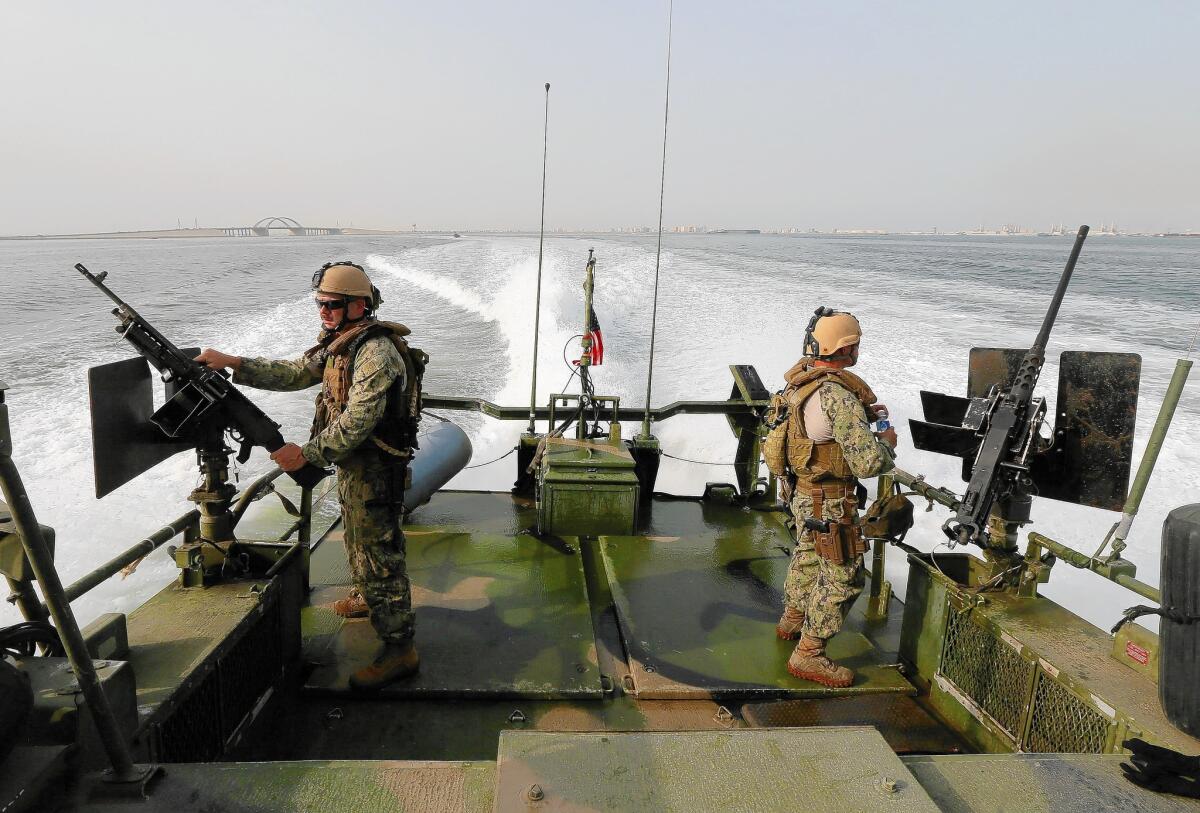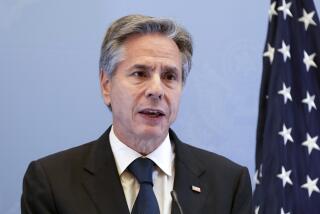Critics decry lack of U.S. response to Bahrain expulsion

Bahrain’s expulsion last month of the top U.S. diplomat for democracy and human rights was a provocative move that seemed sure to bring a strong reaction from Washington.
But four weeks later, the Obama administration has made no visible response beyond a phone call from Secretary of State John F. Kerry to Bahraini Foreign Minister Sheik Khalid bin Ahmed Khalifa expressing U.S. concern.
Critics are warning that the low-key U.S. reaction will be read abroad as a sign of weakness and encourage other governments to push back when Washington presses for reforms on governance and human rights.
“If they don’t take action, you can bet other countries will do similar things,” said Cole Bockenfeld of the Washington-based advocacy group Project on Middle East Democracy.
Tom Malinowski, the assistant secretary of State for democracy, human rights and labor, was asked to leave the Persian Gulf emirate on July 7 after he attended a reception held by Wefaq, the country’s largest political opposition group. Wefaq represents Bahrain’s predominantly poor Shiite Muslim majority, which is viewed with suspicion by the Sunni Muslim-led monarchy.
U.S. officials have been pushing both sides to reach a deal that could give Wefaq and smaller opposition groups some representation in the parliament. But the talks have made little progress.
Malinowski said Bahraini government officials had approved the meeting, and his attendance, in advance. But Bahraini authorities say the meeting broke a recent law that requires an official representative at such meetings.
U.S. dealings with Bahrain are complicated by tensions between efforts to push Bahraini leaders toward democratic reform and Washington’s desire to maintain strong strategic ties to the country. The tiny emirate provides a home port for the U.S. Navy’s 5th Fleet, across the Persian Gulf from Iran.
After Malinowski’s expulsion, Bahraini authorities filed criminal charges against two Wefaq leaders who attended the meeting. They have since brought a lawsuit against Wefaq that has left in doubt whether the organization will be able to participate in parliamentary elections scheduled this fall.
The expulsion of a U.S. diplomat at Malinowski’s level is rare — some analysts say unprecedented. Often, the U.S. has responded to expulsions by demanding that the offending country’s ambassador leave the United States.
But though U.S. officials said they were “considering their options” after the expulsion, there is no sign they have retaliated in any way.
Indeed, they distanced themselves from a message Malinowski sent on Twitter blaming his expulsion on the desire of some Bahraini officials to undermine the talks with Wefaq. That was not the U.S. view, a State Department spokeswoman said.
U.S. officials say they’re quietly talking with the Bahrainis in hopes of resuming the dialogue with Wefaq and reaching an agreement that would allow Malinowski to return. They say that the more important of the two issues is the negotiations.
“I hope to go back,” Malinowski told NBC News last week. “But the more important thing is achieving our objective of a successful dialogue and a political reconciliation.”
A group of 18 democracy advocates, including some former senior U.S. officials, wrote national security advisor Susan Rice last week urging the administration to take a firmer line. The administration should cancel visas for Bahraini officials and halt arm sales until Malinowski is welcomed back and the charges against the two Bahrainis are dropped, the group said in a letter.
The expulsion “threatens the ability of the United States to advocate for democracy or human rights worldwide,” the group wrote. The letter was signed by two of Malinowski’s predecessors, Lorne Craner and David Kramer, as well as Anne-Marie Slaughter, who was the State Department’s planning director during President Obama’s first term.
Another factor may be at play in the administration’s desire to go easy: simultaneous crises in Syria, Iraq and the Gaza Strip, and the delicate nuclear talks with Iran, several analysts said. The administration doesn’t want to risk its relationship with Bahrain, or its close ally Saudi Arabia, with all that going on, they said.
“One piece of this may be an attitude: ‘Let’s not shake things up if we don’t have to,’” said Bockenfeld of the Project on Middle East Democracy.
More to Read
Start your day right
Sign up for Essential California for news, features and recommendations from the L.A. Times and beyond in your inbox six days a week.
You may occasionally receive promotional content from the Los Angeles Times.







